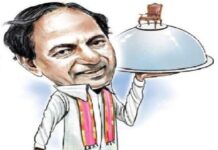Sir Salar Jung, it might sound a little alien, but just about every Hyderabadi and anyone who has heard of Hyderabad would be aware of the Salar Jung Museum. Incidentally, Sir Salar Jung was one of the most popular prime ministers of native states and was known to be the enigmatic prime minister of Hyderabad state (1853 to 1883), who served for three long decades under three successive Nizams.
Sir Salar Jung I, the enigmatic Prime Minister of Hyderabad State (1853-1883), who served for three-long decades under three successive Nizams from 1853, has left such an indelible mark that any history of the Nizams’ rule in Hyderabad will never be complete without making a mention of the services rendered by him. As a loyal Prime Minister, he was to the Nizam what Otto Von Bismarck was to Kaiser Wilhelm, in Germany.
Sir Salar Jung rightfully earned the name as “the greatest Prime Minister of any State in British India.” The period of his Prime Ministership rightfully came to be known as the Age of Salar Jung in the history of Hyderabad dominions. In recognition of his services, the then government of India in 1871 bestowed on him the title ‘Grand Commander of the Star of India’.
While the reforms Sir Salar Jung I introduced in Hyderabad State during the period of his administration are well documented, what is less known is the high-profile official visit he undertook to England at the personal invitation of the Prince of Wales, who earlier had visited Hyderabad.
In April 1876, Salar Jung with a large entourage consisting of his advisers, officials and personal staff numbering 52, set sail to England from Bombay. On the way, he reached Rome early in May and called on the king of Italy, Victor Emmanuel II. A few days later, Sir Salar Jung and his party had an audience with the Pope. After visiting Venice, Naples and Florence for weekdays, the party reached Paris on May 13.
Parisian Persecution
The very day he arrived in Paris, Salar Jung accidentally slipped on the stairs of the Grand Hotel where he stayed, resulting in the fracture of his left thigh bone and the doctors advised him complete rest. Though the stay in Paris was planned only for a day, his journey to England was, therefore, delayed by two weeks.
As Salar Jung’s stay came to be known in Paris, several local visitors started thronging the Grand Hotel to see him with strange requests. Having heard of the Nizam’s fabulous riches in Hyderabad, the Parisian tailors, hat-makers, shoe-makers, jewellers and a host of others queued up to seek employment in Hyderabad. Some others came for financial help, some others with copious poetry praising the Prime Minister of Hyderabad and his munificence. Watching thus 20 to 30 visitors every day, Salar Jung is reported to have jocularly told his private secretary, Syed Hussain Bilgrami, that what he was undergoing was “Parisian Persecution”. By May-end, Sir Salar Jung was able to resume his journey to England though his injury was not completely healed.
A British steamer that was kept waiting at Boulogne took Salar Jung and his party to England. After crossing the English Channel, he was formally received at Folkestone on 1 June 1876 by the Duke of Sutherland. Salar Jung was carried ashore in an armchair by English sailors. The Mayor of Folkestone presented the welcome address. Several leading newspapers gave prominent coverage of his visit. Salar Jung took residence, along with his Hyderabad team, in a palatial mansion at Piccadilly square in the most fashionable part of Central London.
A grand banquet was hosted on 20 June 1876 by the Duke of Wales in Salar Jung’s honour at Marlborough House, and it was attended by a number of members of the Royal household like the Duke of Connaught, the Duke of Cambridge, the Duke of Manchester and the Duke of Sutherland — the sons of Queen Victoria, with their respective Duchesses. Besides, there were the likes of Marquess of Salisbury, Earl Granville, Earl of Northbrook, Earl Napier and Benjamin Disraeli and a host of other dignitaries, who graced the occasion.
Oxford Honour
The day after the Duke of Wales hosted the banquet, Salar Jung’s great hour of honour came from the Oxford University. At a specially held commemorative ceremony, Oxford University conferred DCL (Doctor of Civil Laws) on Sir Salar Jung. No other Minister of a Native State in India by then had such an honour from Oxford.
Sir Salar Jung was received by Queen Victoria at the Windsor Castle on 3 July 1876 where, after the banquet, he stayed back for the night and returned to his residence the next day. This was probably the only occasion when a non-royal, like Salar Jung, ever stayed at this centuries-old British Royals’ private residence, the Windsor. Two days later, the Queen invited Salar Jung to dine at the Buckingham Palace, an honour generally accorded to a head of State. Salar Jung also went on a tour to Scotland accompanied by the Duke of Sutherland. He visited several cities like Edinburgh and Inverness in Scotland before returning to London. When Lord Salisbury, the Prime Minister, hosted a dinner in his honour, several dignitaries in England, including the Duke of Wales, were present, and on the next day newspapers in London reported the event as the top story.
The Town Council of London in a glittering ceremony held at Guildhall on July 25 conferred the honorary Freedom of the City, London, on Salar Jung. The Lord Mayor presenting his address was moved to observe: “It has not happened heretofore that a Minister of a native Indian ruler has received the honorary freedom of this ancient city”. After the ceremony, the Mayor escorted Salar Jung and the entire Hyderabad party to the Mansion House for a banquet where about 300 guests awaited. The entire route from Guildhall to Mansion House was lined up by excited London crowds anxious to have a glimpse of Hyderabad’s Prime Minister.
Royal Engagements
Salar Jung’s high profile engagements with the members of the Royal family gave rise to many funny stories, crafted by gossip mongers in London. One such interesting tale that came to the notice of SH Bilgrami through his attendants was “that Salar Jung was the son of the Turkish Sultan who revolted against his father to seize the throne. So the Sultan put the Prince in prison but he escaped by jumping off the high wall that left him with a slight limp in the leg. And therefore he had come away seeking asylum with his fifty close followers”. When this story was narrated by Bilgrami in private, Salar Jung had a hearty laugh.
After a stay of more than two months in England, during which he won the esteem and regard of everyone who came in contact, Salar Jung left London on 31 July. Though he was entertained by the highest in England, his success never went into his head. The house he lived with his entire party was kept on a princely scale but without any ostentation or any vulgar show. His manners and social etiquette were like a well-bred English gentleman that many people in England wondered how a native of India who had never been to England earlier could pick up English customs, manners and ethos besides the language so well.
Salar Jung and his party on the way back halted for two days in Paris, which he called as City of Pleasure, and after visiting Turin and Milan, embarked on the PO Steamer on 8 August 1876 and arrived in Bombay on 24 August. Two days later, Sir Salar Jung and his party arrived in Hyderabad by train to a rousing reception, concluding his tour to England, the first-ever by Hyderabad’s Prime Minister.
After Salar Jung’s visit to England, Hyderabad was never the same. It was not only English education, but also English customs, manners, dress and even western etiquette that started creeping into the elite circles of Hyderabad. The flamboyant young Nizam, Mahaboob Ali Pasha himself took to a signature dress that was highly influenced by the west and his wardrobe, considered as the largest one in the world, was fed by an army of tailors directly brought from England.
Maker of Modern Hyderabad
The credit to have brought remarkable changes in the administration of Hyderabad State rightfully belongs to Sir Salar Jung I. His tenure is known for varied reforms that included reorganisation of police and judicial system, construction of the first rail and Telegraph networks.
In 1854, he established the Darul-Uloom College and Madarsa Aliya; paving the way for modern education in Hyderabad. The Aligarh Movement in Hyderabad was a result of his modernising efforts.
Powerful Regent
Salar Jung I’s powers as the Prime Minister reached a high watermark when he was appointed additionally, as the Regent to the three-year-old Nizam, Mir Mahaboob Ali, who succeeded his father, Afzal ud Doulah in 1869. Most of the far-reaching reforms for which Sir Salar Jung is well known were initiated during this period of Regency when he enjoyed greater autonomy and was the sole administrator of the State between 1869 and 1883. His daughter, Amat-uz-Zehra Begam, was married to Nizam Mahaboob Ali, and of the union was born, Mir Osman Ali Khan, the last of the Nizams.
On The High Table
Salar Jung was received by Queen Victoria at the Windsor Castle on 3 July 1876 where, after the banquet, he stayed back for the night. This was probably the only occasion when a non-royal stayed at the centuries-old British Royals’ private residence. Two days later, the Queen invited him to dine at the Buckingham Palace, an honour generally accorded to a head of State.
Sir Mir Thurab Ali Khan, popularly known as Sir Salar Jung I, served as the Prime Minister of Hyderabad State for three decades from 1853 till his death in 1883. He was hailed as the greatest of all the Diwans/Prime Ministers of the native States in India. Sir Salar Jung was born on 21 January, 1829 and died on 8 February, 1883. #KhabarLive #hydnews







